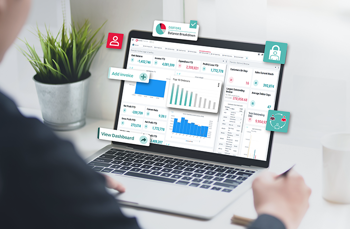Cloud vs On-Premise Accounting Software: How Do They Compare?
Although historically, accounting software was most often housed on an on-premise server and managed locally, the emergence and evolution of cloud computing has meant that cloud accounting software is now more widespread.
But you may be wondering what the difference is between on-premise and cloud accounting software. In this article we explain the key differences and which solution is best for your business.
What are the differences between cloud accounting software and on-premise accounting software?
The answer is simple. On-premise accounting software is hosted by your business, at your premises, on your own servers and hardware, and installed on your computers. In contrast, cloud accounting software is securely hosted by a third-party specialist cloud provider and your staff simply log in to access your software and data.
Cloud accounting software still automates all the usual financial processes including accounts payable and receivable, income, expenses, reporting and more. Ultimately, it covers the same functions and automation as an up-to-date on-premise application, it is simply accessed differently.
There are lots of advantages to consider. Use this article to gain a quick and informative insight into the key differences and benefits of cloud accounting software versus an on-premise accounting solution.
Here’s a quick summary of each.
What is on premise accounting software?
On premise accounting software requires an in-house server, software is installed on individual devices, and often needs to be integrated with other company systems. An IT team has to manage the system including any maintenance, patches, fixes and updates. Access Dimensions is an example of on-premise accounting software.

What is cloud accounting software?
Cloud accounting software (like Access Financials) is hosted off site, removing the requirement for your own company server and infrastructure. The cloud provider’s highly secure infrastructure and datacentre hosts your accounting software and your users simply log in to access the tools and data they need.

The key differences between cloud and on-premise accounting software
What are the advantages of cloud based accounting vs on-premise accounting software?
1. Greater business protection
Moving to cloud based accounting gives your business the added peace of mind from multiple security layers with around the clock monitoring. Enjoy optimum protection against cyberattack or system failure.
2. Enhanced data security
All data is backed up and replicated at a second secure datacentre, which means you can be back up and running quickly if you had to activate your business continuity plan.
3. Supports hybrid working
A cloud accounting solution provides robust connectivity and full functionality, enabling your staff to work effectively from home or any other location.
4. Increased productivity
Is often an unexpected benefit when you provide your Finance team with the latest tools and functionality to make their jobs easier. This is especially true if your on-premise legacy system has become unwieldy or outdated.
5. Regular updates
New features and functionality are automatically updated on cloud accounting software, so your business will always operating on the most up-to-date version with continual support. Compare this to the time taken to update on-premise accounting systems with patches, manual updates and resolving integration issues.
6. Strong cost/benefit case
On-premise accounting software requires capital expenditure for hardware upgrades. In contrast, cloud accounting software is cost-effective to implement, subscriptions are easy to budget for, and your IT resource is released from time-consuming software fixes.
7. Flexible and scalable
On-premise accounting systems can be complex and expensive to scale. Cloud accounting software is a great choice for growing businesses because it’s quick and easy to add users (or to reduce numbers) enabling you to flex capabilities as your business needs change.
Cloud vs on-premise accounting software: Which is best for your organisation?
Of course, only you can decide. It is worth mentioning that one of the key concerns often cited as a reason not to make the change to cloud accounting software is security – however this is actually a compelling reason ‘for’ not ‘against’. Here’s why…
Staying safe and secure requires significant and ongoing investment. The security steps taken by a cloud accounting software provider supporting multiple businesses will be far more sophisticated and complex than anything that is affordable or achievable for most individual companies. Cloud service providers implement the highest security standards and industry certifications – not least because their business depends on it. Cloud infrastructure is designed for resilience with multi-layer security and around the clock protection against physical and cyber threats. The policies, procedures and security in place to protect and secure your information in the cloud means that data is likely to be far more secure in a cloud data centre environment than in any dedicated on-site server room.
Finally, do bear in mind that the majority of businesses have either already moved to the cloud, or are planning to do so. As we’ve seen in this article, there are plenty of reasons why, but for most it’s likely simply to be because it enables them to do so much more.

Are you ready to switch your accounting software?
For expert guidance on moving to cloud accounting software, contact us. Our cloud accounting software experts can provide the support your business needs to make the switch.
Alternatively, why not read more about switching your finance and accounting software.
If you've not yet chosen a cloud accounting system to switch to, you can explore our solution and book a demo with us to see it in action before you buy.
Want to know more?
Have a read through more accounting software information, guidance and advice.




